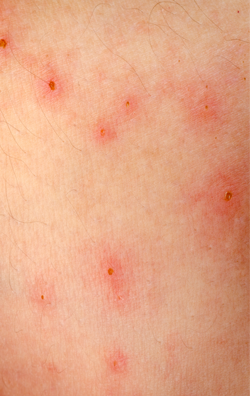
A muscle cramp is a sudden, severe involuntary contraction of muscles, called muscle spasms, which are generally temporary and non damaging. The muscles tightens on its own and refuse to relax for a period of time. It comes without any warning and resolves itself within seconds, minutes or a few hours. There are two major types of cramps like skeletal muscle cramps including muscle fatigue, and/or a lack of electrolytes like low sodium, low potassium, and/or low magnesium and cramps of smooth muscle tissue that may be due to menstruation or gastroenteritis.
Cramping is caused due to hyperflexion, hypoxia, exposure to large changes in temperature, dehydration, or low blood salt. Muscle cramps can also be an indication of complication in pregnancy, kidney disease, thyroid disease, hypokalemia, hypomagnesemia or hypocalcemia, restless-leg syndrome, varicose veins, and multiple sclerosis. Another reason observed is that it's caused due to excess insulin, called hyperinsulinemia.
The muscle groups which are commonly involved are:
1) Back of the lower leg/calf
2) Back of the thigh (hamstrings)
3) Front of the thigh (quadriceps)
Feet, hands, arms, abdomen, and along the rib cage cramps are also very common. These cramps are very common and may be stopped by stretching the muscle. The cramping muscle may be hard or bulging when felt. Muscle cramps are sometimes called charley horses, especially when they are in the calf muscles.
The possible causes of muscle cramps are :
1) Bad blood circulation in the legs
2) Overexertion of the muscles while exercising
3) Absense stretching before exercise
4) Exercising in the heat
5) Muscle tiredness
6) Dehydration
7) Deficiency of magnesium and/or potassium
8) Pregnant women's calcium deficiency
9) Malfunctioning of nerves, which could be caused by a problem such as a spinal cord injury or pinched nerve in the neck or back.
Muscle cramps can also occur as a side effect of some drugs like :
1) Lasix (furosemide), Microzide (hydrochlorothiazide), and other diuretics ("water pills") used to remove fluid from the body
2) Aricept (donepezil), used to treat Alzheimer's disease
3) Prostigmine (neostigmine), used for myasthenia gravis
4) Procardia (nifedipine), a treatment for angina and high blood pressure
5) Evista (raloxifene), an osteoporosis treatment
6) Brethine (terbutaline), Proventil and Ventolin (albuterol), asthma medications
7) Tasmar (tolcapone), a medication used to treat Parkinson's disease
8) Statin medications for cholesterol such as Crestor (rosuvastatin), Lescol (fluvastatin), Lipitor (atorvastatin), Mevacor (lovastatin), Pravachol (pravastatin), or Zocor (simvastatin)
Cramps can be removed by stretching, massaging and drinking plenty of fluids, such as water or icing the muscle, warming the muscle, or taking a bath with Epsom salt. With exertional heat cramps due to electrolyte abnormalities, primarily due to sodium loss, appropriate fluids and sufficient salt helps to improve it. While heat relaxes the muscles when the spasm begins, ice may be helpful when the pain has improved. If the pain is still present, nonsteroidal anti-inflammatory medications can help with pain.
More prolonged cramps may be treated with drugs such as carbamazepine, phenytoin, or quinine. Replacement of fluid and salt either orally or intravenously, is used to treat dehydration. Treatment of underlying metabolic or neurologic disease may help relieve symptoms. It may be treated or prevented with Ginkgo biloba or Japanese quince. Supplements of vitamin E, niacin, calcium, and magnesium are also helpful. Taken at bedtime, they may help to reduce the possibility of night cramps.
The most common cause of muscle cramps during sports activity is the absence of enough fluids. Drinking water almost always will ease the cramping. Salt tablets or sports drinks that can replenish lost minerals can be helpful also. Cramps can be reduced by eating a healthy diet with appropriate levels of minerals, and getting regular exercise to build up energy reserves in muscle. Exercise avoidance in extreme heat helps prevent heat cramps. Taking a warm bath before bedtime may increase circulation to the legs and reduce the occurance of nighttime leg cramps. Self-care measures are sufficient for dealing with muscle cramps in most cases. But if you repeatedly experience them or for no apparent reason, you should be vigilant and should be tested for other possible problems which requires treatment.





